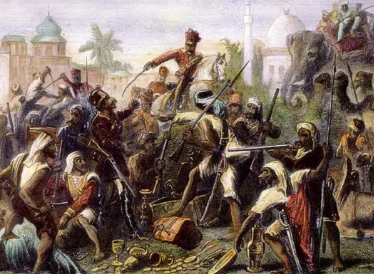The Indian Rebellion of 1857, also known as the Great Indian Mutiny, was a significant uprising of the Indian people against British colonial rule in the mid-19th century. The rebellion lasted for over two years and dealt a heavy blow to the British colonizers. However, in a certain sense, the Indian Rebellion of 1857 did not achieve complete success. This article analyzes the success and failure of the rebellion from its background, process, and outcome.

Firstly, from the perspective of the rebellion's background, the outbreak of the Indian Rebellion of 1857 was due to the brutal exploitation and oppression by the British colonizers. Through the East India Company, the British exercised colonial rule over India, controlling various aspects of Indian politics, economy, and culture. They imposed a strict caste system on the Indian people, stripped them of their rights, and made Indian social conflicts increasingly acute. Under such a background, the outbreak of the rebellion was inevitable.
Secondly, in terms of the rebellion's process, the Indian Rebellion of 1857 achieved certain successes. After the outbreak of the rebellion, various regions in India responded, forming an unprecedented struggle. The rebels achieved a series of important victories in the northern and central regions of India, posing a threat to British colonial rule. However, as the war progressed, weaknesses of the rebel forces gradually emerged, such as disagreements among the leadership and the dispersal of troops. These issues prevented the rebels from forming a cohesive force at critical moments, ultimately leading to their defeat by the British colonizers.
Lastly, regarding the outcome of the rebellion, the Indian Rebellion of 1857 did not achieve complete success. Although the rebellion dealt a heavy blow to the British colonizers, Britain did not abandon its rule over India. On the contrary, after suppressing the rebellion, Britain increased its control over India, further consolidating its position. Additionally, the failure of the rebellion plunged the Indian nationalist movement into a lull, which required a long time to regain strength.
In conclusion, the Indian Rebellion of 1857 was an unsuccessful struggle. Although the rebellion achieved certain successes, it ultimately failed to achieve the goal of national independence due to various reasons. However, this rebellion was significant in inspiring the national pride and confidence of the Indian people and promoting the development of the Indian nationalist movement. As a historian once said, "Although the Indian Rebellion of 1857 failed, it kindled the spark for India's national liberation."
Disclaimer: The above content is sourced from the internet and the copyright belongs to the original author. If there is any infringement of your original copyright, please inform us and we will delete the relevant content as soon as possible.































